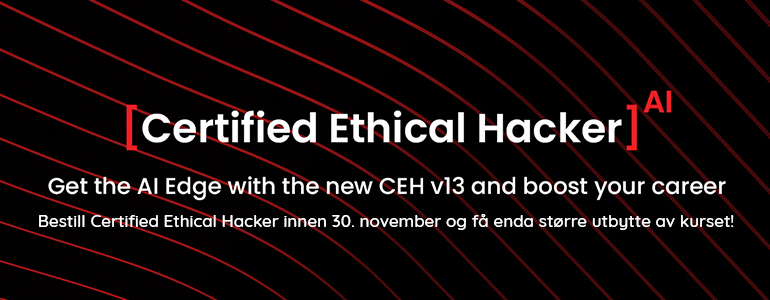
The Certified Ethical Hacker has been battle-hardened over the last 20 years, creating hundreds of thousands of Certified Ethical Hackers employed by top companies, militaries, and governments worldwide. The CEH v13 is a specialized and one-of-a-kind training program to teach you everything you need to know about ethical hacking and provide you the knowledge and skills needed to drive your career forward in the age of AI.
With CEH you'll learn how to think like a hacker and uncover any hidden vulnerabilities before hackers do. Stay on top of the game with the most in-demand skills required to succeed in the field of cybersecurity.
CEH is a great place to start your career in Cyber Security. There are no specific prerequisites for the CEH program. However, we strongly recommend that candidates possess a minimum of 2 years IT security experience before attempting the CEH.
The CEH v13 training program includes 20 modules covering various technologies, tactics, and procedures, providing prospective ethical hackers with the core knowledge needed to thrive in cybersecurity. Delivered through a carefully curated training plan that spans five days, the 12th version of the CEH continues to evolve to keep up with the latest OS, exploits, tools, and techniques.
The concepts covered in the training program are split 50/50 between knowledge-based training and hands-on application through our cyber range. Every tactic discussed in training is backed by step-by-step labs conducted in a virtualized environment with live targets, live tools, and vulnerable systems. Through our lab technology, every participant will have comprehensive hands-on practice to learn and apply their knowledge.
Module 01: Introduction to Ethical Hacking
Learn the fundamentals and key issues in information security, including the basics of ethical hacking, information security controls, relevant laws, and standard procedures
Module 02: Foot printing and Reconnaissance
Learn how to use the latest techniques and tools for footprinting and reconnaissance, a critical pre-attack phase of ethical hacking
Module 03: Scanning Networks
Learn different network scanning techniques and countermeasures.
Module 04: Enumeration
Learn various enumeration techniques, including Border Gateway Protocol (BGP) and Network File Sharing (NFS) exploits and associated countermeasures.
Module 05: Vulnerability Analysis
Learn how to identify security loopholes in a target organization’s network, communication infrastructure, and end systems. Different types of vulnerability assessment and vulnerability assessment tools are also included.
Module 06: System Hacking
Learn about the various system hacking methodologies used to discover system and network vulnerabilities, including steganography, steganalysis attacks, and how to cover tracks.
Module 07: Malware Threats
Learn about different types of malware (Trojan, viruses, worms, etc.), APT and fileless malware, malware analysis procedures, and malware countermeasures.
Module 08: Sniffing
Learn about packet sniffing techniques and their uses for discovering network vulnerabilities, plus countermeasures to defend against sniffing attacks.
Module 09: Social Engineering
Learn social engineering concepts and techniques, including how to identify theft attempts, audit human-level vulnerabilities, and suggest social engineering countermeasures.
Module 10: Denial-of-Service
Learn about different Denial of Service (DoS) and Distributed DoS (DDoS) attack techniques, plus the tools used to audit a target and devise DoS and DDoS countermeasures and protections.
Module 11: Session Hijacking
Learn the various session-hijacking techniques used to discover network-level session management, authentication, authorization, and cryptographic weaknesses and associated countermeasures.
Module 12: Evading IDS, Firewalls, and Honeypots
Learn about firewalls, intrusion detection systems (IDS), and honeypot evasion techniques; the tools used to audit a network perimeter for weaknesses; and countermeasures
Module 13: Hacking Web Servers
Learn about web server attacks, including a comprehensive attack methodology used to audit vulnerabilities in web server infrastructures and countermeasures.
Module 14: Hacking Web Applications
Learn about web application attacks, including a comprehensive hacking methodology for auditing vulnerabilities in web applications and countermeasures.
Module 15: SQL Injection
Learn about SQL injection attack techniques, evasion techniques, and SQL injection countermeasures.
Module 16: Hacking Wireless Networks
Learn about different types of encryption, threats, hacking methodologies, hacking tools, security tools, and countermeasures for wireless networks.
Module 17: Hacking Mobile Platforms
Learn mobile platform attack vectors, Android and iOS hacking, mobile device management, mobile security guidelines, and security tools.
Module 18: IoT and OT Hacking
Learn different types of Internet of Things (IoT) and operational technology (OT) attacks, hacking methodologies, hacking tools, and countermeasures.
Module 19: Cloud Computing
Learn different cloud computing concepts, such as container technologies and serverless computing, various cloud computing threats, attacks, hacking methodologies, and cloud security techniques and tools.
Module 20: Cryptography
Learn about encryption algorithms, cryptography tools, Public Key Infrastructure (PKI), email encryption, disk encryption, cryptography attacks, and cryptanalysis tools.
C|EH Practical is a 6-hour, rigorous exam that requires you to demonstrate the skills and abilities of ethical hacking techniques such as:
Within C|EH Practical, you have a limited amount of time to complete 20 challenges that test your skills and proficiency in a performance-based cyber range. This exam is NOT a simulation and incorporates a live corporate network of VMs and applications with solutions to uncover vulnerabilities.
If you pass both the C|EH knowledge based exam and the C|EH Practical exam, the C|EH Master designation is awarded.
Price for additional CEH Practical exam
The additional price for CEH Practical exam is NOK 2500.
If you want to book the additional practical exam you need to inform Glasspaper about this upon placing your booking.